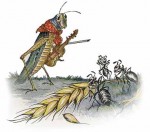 One bright day in late autumn a colony of ants were bustling about in the warm sunshine, drying out the grain they had stored up during the summer, when a starving Grasshopper, his fiddle under his arm, came up and humbly begged for a bite to eat.
One bright day in late autumn a colony of ants were bustling about in the warm sunshine, drying out the grain they had stored up during the summer, when a starving Grasshopper, his fiddle under his arm, came up and humbly begged for a bite to eat.
“What!” cried the ants in surprise, “haven’t you stored anything away for the winter? What in the world were you doing all last summer?”
“I didn’t have time to store up any food,” said the Grasshopper; “I was so busy making music that before I knew it the summer was gone.”
The ants shrugged their shoulders in disgust.
“Making music, were you?” they cried. “Very well; now dance!” And they turned their backs on the Grasshopper and went on with their work.
The Moral is that there is a time for work and a time for play.
The End (of Aesop’s original fable)
Okay, the way I see it, the grasshopper represents the musicians, artists and writers of the world. The ants represent the rest of society. Naturally, the ants were appalled that the grasshopper hadn’t been working a regular job, and failed to see the value of how he had chosen to spend his time. Here’s how it ends in my version:
The pleasant autumn ended, and winter quickly arrived. Soon, safe below the ground, the ants began enjoying the fruits of their labor. As the winter dragged on, though, they grew weary of their monotonous diet, and of their dreary tunnels. They became bored of hearing stories of gathering food and working. They became bored with each other, then sick and tired of each other, and began to wonder why they even bothered, if this is all there was to life. They began to think dangerous thoughts, and whisper ugly words.
Then they heard a faint sound from outside the tunnel entrance. It was the Grasshopper and his fiddle. They crowded nearer to the sound, desperate for any relief from their hard and predictable lives. After a while, a young ant, who hadn’t yet learned to be judgmental, invited the Grasshopper in.
For the rest of the winter, the Grasshopper played his fiddle for them, singing songs of the things he’d seen in his travels over the summer. He shared the ideas he’d heard, and expressed the feelings that had filled his days and nights as he wandered with his fiddle. The ants shared their food with him in return, happy that sound and color had returned to their world.
The Moral is that some of us work in the tangible, and others less so, but we all have value.
The End (according to me)
So why have I rewritten this Aesop’s Fable and posted it here, in the About Me section?
Well, I guess I’m a Grasshopper. I’ve never excelled at collecting grain for the winter ahead. Instead, I’ve always felt that it was my purpose in life to assimilate the essence of whatever I was experiencing. I feel that the impressions and perceptions I’ve collected over my lifetime of doing this and trying that are the wages I’ve earned, more so than dollars or other conventional markers of accomplishment. (Of course, my wife takes a different view; the Yin to my Yang.)
In the act of creating something, these intangible impressions and perceptions are made tangible, and this is what I have to offer.
